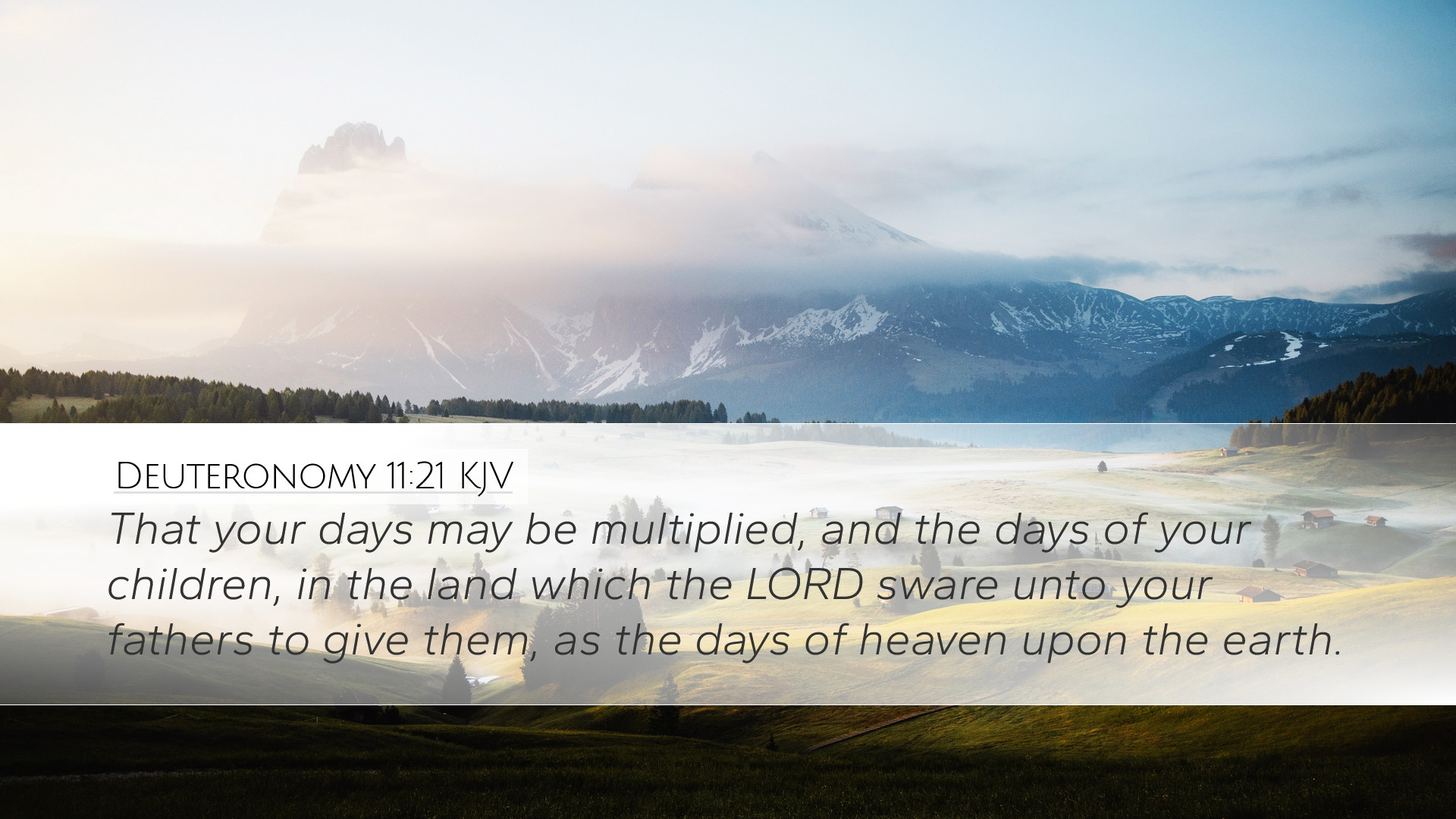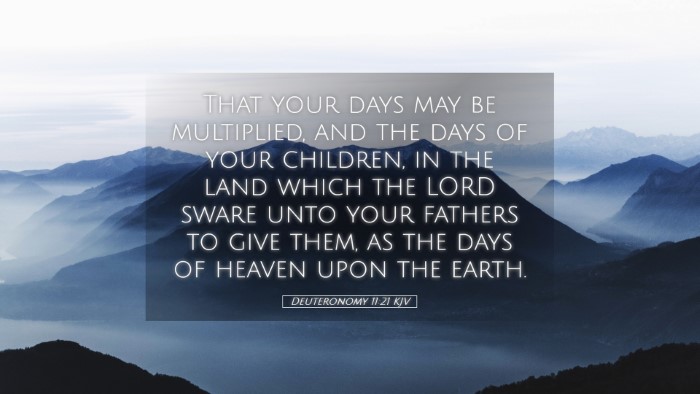Commentary on Deuteronomy 11:21
Bible Verse: Deuteronomy 11:21 - "That your days may be multiplied, and the days of your children, in the land which the LORD sware unto your fathers to give them, as the days of heaven upon the earth."
Introduction
This significant verse from Deuteronomy encapsulates the themes of covenant, blessing, and the promise of longevity in the land promised to the Israelites. In this commentary, we will draw insights from renowned public domain theologians such as Matthew Henry, Albert Barnes, and Adam Clarke to provide a comprehensive study that is meaningful for pastors, students, theologians, and Bible scholars.
Thematic Overview
Deuteronomy 11:21 emphasizes the results of obedience to God’s commandments and the consequent blessings of life. It highlights important theological themes including:
- The Covenant Relationship: The verse underscores God's promise to the ancestors of Israel.
- Generational Blessing: The focus on both the days of the people and their children implies a profound generational impact.
- Divine Abundance: The phrase "as the days of heaven upon the earth" conveys an abundance of life and features God's favor.
Commentary Insights
Matthew Henry's Perspective
Matthew Henry emphasizes that this passage reflects the tangible benefits of living in accordance with God’s will. He delves into the idea that the Israelites’ obedience will not only prolong their own lives but also enrich the lives of their descendants. Henry interprets the phrase "as the days of heaven upon the earth" as a metaphorical expression of the blessedness and prosperity that follows a life aligned with divine expectations.
Key Points According to Henry:
- Obedience Brings Blessing: Living a life of obedience leads to divine rewards.
- Impact on Posterity: The blessings enjoyed by one generation can transcend to ensuing generations.
- Divine Assurance: The promise of the land signifies not just physical territory but spiritual inheritance as well.
Albert Barnes' Observations
Albert Barnes offers a deep dive into the conditions surrounding the promise made to the Israelites. He meticulously explores the significance of “the land which the LORD sware”. Barnes points to the importance of this land, particularly in the context of Israel’s identity and God’s fidelity to His promises. He articulates the idea of prosperity as a direct blessing resulting from fidelity to God's commandments.
Insights from Barnes:
- Context of Promise: The reference to the ancestors underscores Israel's historical journey with God.
- Life of Abundance: The verse illustrates that life lived in God's presence equates to bounty.
- Long-term Consequences: The impact of one’s faithfulness can echo through generations, offering a sense of stability and continuity.
Adam Clarke's Analysis
Adam Clarke interprets this verse with an emphasis on the theological ramifications of divine promises. His commentary discusses the role of divine law and the moral precepts that guide the life of the Israelites. Clarke notes that the "days of heaven upon the earth" speak to the ideal state of life that God desires for His people - a life characterized by peace, joy, and obedience to His commands.
Critical Points from Clarke:
- Moral Imperatives: Clarke highlights how divine laws contribute positively to human flourishing.
- Heavenly Paradigm: The imagery used suggests that earthly life can reflect heavenly truths.
- Generational Faithfulness: Emphasizes the ripple effect of faithfulness across generations in the community.
Theological Implications
This verse prompts readers to consider the implications of divine promises on both personal and communal levels. The connection between obedience and divine blessing invites reflection on the responsibilities that accompany such blessings.
Pastoral Applications
For pastors and church leaders, this text is a reminder of the importance of teaching obedience to God’s commandments within the congregation. The ideal of a long and blessed life rooted in spiritual fidelity offers a powerful framework for preaching and discipleship.
Scholarly Reflections
The scholarly community can draw upon this text as a foundational teaching on covenant theology, exploring how the Old Testament's emphasis on the land and descendants continues to reverberate through the New Testament understanding of the Kingdom of God.
Conclusion
Deuteronomy 11:21 encapsulates the richness of God's promises to His people. Drawing on insights from Matthew Henry, Albert Barnes, and Adam Clarke not only informs our understanding of the text but also invites an exploration of its implications for life and ministry. As we strive to walk in obedience, may we grasp the fullness of God’s promise for our lives and those of our descendants, echoing the days of heaven upon the earth.


